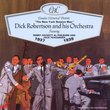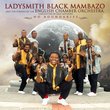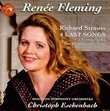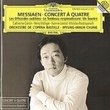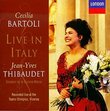| All Artists: George Frideric Handel, John Nelson, Ensemble Orchestral De Paris, Ian Bostridge, David Daniels, Christine Brandes, Lynne Dawson, Alastair Miles, Bach Choir Title: Handel - L'Allegro, il Pensoroso el il Moderato / Brandes, Dawson, Daniels, Bostridge, Miles, Nelson Members Wishing: 0 Total Copies: 0 Label: EMI Classics Release Date: 11/7/2000 Genre: Classical Styles: Opera & Classical Vocal, Historical Periods, Baroque (c.1600-1750), Symphonies Number of Discs: 2 SwapaCD Credits: 2 UPCs: 724354541728, 724354541759 |
Search - George Frideric Handel, John Nelson, Ensemble Orchestral De Paris :: Handel - L'Allegro, il Pensoroso el il Moderato / Brandes, Dawson, Daniels, Bostridge, Miles, Nelson
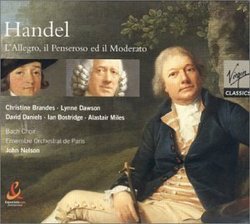 | George Frideric Handel, John Nelson, Ensemble Orchestral De Paris Handel - L'Allegro, il Pensoroso el il Moderato / Brandes, Dawson, Daniels, Bostridge, Miles, Nelson Genre: Classical
One of the best ideas Handel and his colleagues ever had was to make an oratorio out of John Milton's verse--specifically, of Milton's "L'Allegro" and "Il Penseroso" ("The Happy Man" and "The Pensive Man"), with the libr... more » |
Larger Image |
CD DetailsSynopsis
Amazon.com One of the best ideas Handel and his colleagues ever had was to make an oratorio out of John Milton's verse--specifically, of Milton's "L'Allegro" and "Il Penseroso" ("The Happy Man" and "The Pensive Man"), with the libretto cutting back and forth between the two poems to make a sort of dialogue, and with an added conclusion titled "Il Moderato" ("The Moderate Man"). The resulting work has never been as famous as Messiah, but it has always been a special favorite of Handel lovers. The King's Consort made a fine recording of L'Allegro in 1999; the selling point of the present version (which appeared almost exactly one year later) is the cast of soloists, which includes soprano Lynne Dawson and countertenor David Daniels, both genuine Baroque superstars, and tenor Ian Bostridge, current king of the art song. All three are very good indeed (as is bass Alastair Miles), with Bostridge in particularly fine form. You wouldn't think anyone could outdo the King's Consort's extraordinary Paul Agnew, but Bostridge does: every vocal color is apt, every word is completely clear. Interestingly, the aria everyone looks forward to, "Sweet Bird," goes not to Dawson but to her younger colleague Christine Brandes. The coloratura holds no problems for Brandes, though she sounds as if she's having to work harder than does Lorna Anderson for the King's Consort (to say nothing of the divine Miss Emma). The Ensemble Orchestral de Paris is a modern-instrument group seemingly doing an imitation of period instruments, and they very nearly succeed. (It's the smooth, brassy trumpets that give them away.) The players have obviously learned something from their period-instrument colleagues: the sound is nice and lean, balance problems are minor, and the flute soloist in "Sweet Bird" does a fair imitation of an old flauto traverso. John Nelson's tempos are often very quick, yet nothing seems rushed; indeed, thanks to Nelson's good judgment and the skill of his soloists, the fast tempos make the music seem like heightened speech. If your shelves and/or wallet can handle only one L'Allegro, the King's Consort would be a better choice at the moment, but real Handel lovers--and fans of Daniels, Dawson, and Bostridge--won't want to miss this. --Matthew Westphal Similar CDs
Similarly Requested CDs
|
CD ReviewsThrilling Version of Handel's Great Setting of Milton George Peabody | 04/12/2003 (5 out of 5 stars) "This is a marvelous recording--infinitely superior, in my opinion, to that of John Eliot Gardiner. The rendering of Milton's wonderful poems is done with so much feeling and intelligence that it adds another level of meaning to the words. The soloists are thrilling, especially the counter-tenor, who gives an essential sense of the Baroque use of boys or castrati. While the Gardiner version employs a boy soprano (as did Handel in the first performance of this oratorio), I find his voice weak, and interesting only as a point of comparison and historical interest. I am not impressed with the idea of "authentic" musical production--I would much rather hear the lively pacing of this recording than the so-called authentic (comatose) tempi of the Gardiner recording. I also prefer contemporary instruments to the ancient or imitation-ancient instruments that are supposed to enhance "authentic" productions. Case in point--the gorgeous transverse flute in this version versus the reedy piping of the recorder in the Gardiner version. Another point: this version includes airs that are left out of the Gardiner version. I suppose there are many iterations of the score since Handel changed it many times in his lifetime...but I love "But, O sad virgin, that thy power..." which is entirely missing from the Gardiner CD. All-in-all, choose this version--you will never tire of listening to it." Handel Oratorio of Milton Verse Most Beautifully Sung Ed Uyeshima | San Francisco, CA USA | 10/11/2004 (5 out of 5 stars) "This exceptional Handel oratorio is based on two of Milton's youthful poems, "L'Allegro" ("The Happy Man") and "il Penseroso" ("The Pensive Man"), as well as Charles Jennens' verse, "il Moderato" ("The Moderate Man")...thus the unwieldy title of this disc! No matter as this pastoral ode is Handel at his finest, in my opinion, just as enthralling a work as his Messiah. The music is clever, joyous and consistently inventive. Thanks to a dynamic all-star cast, this disc completely captures the work's spirit as it is filled with fine melodies and lightning-fast mood changes. The result is a classical vocal recording of the highest order. The five soloists shine brightly. Tenor Ian Bostridge paints his words brilliantly and enunciates the text in a stunning, natural manner that fleshes out every aria and recitative. He can be truly dazzling, for instance, capturing the merriment of his Part 1 solo, "Haste thee nymph". Bostridge seems to recognize every mood with his flexible voice. Complementing him are two stellar sopranos, Lynne Dawson and Christine Brandes. The seasoned Dawson is in full and warm voice, and she has an excellent showcase for her subtlety of phrasing and passionate treatment of words. She can be equally persuasive in Allegro and Penseroso music, for example, in Part 1, with the song group starting with "Come, pensive nun", which is raptly done, and in the spirited "Mirth, admit me of thy crew" just afterward. Her final duet with Bostridge, "As steals the morn upon the night", is a high point. At some points, she could loosen up to better capture the frivolity of some of her solos, but her artistry is amazing nonetheless. Brandes proves up to the challenge of her more experienced colleagues and excels with the extended air, "Sweet bird, that shunn'st the noise of folly", and in her plaintive rendition of "Oft on a plat of rising ground". Bass Alastair Miles also proves himself here, singing the fast, acrobatic music, as well as the more introspective with ease and grace. His high point has to be "Come, with naïve lustre shine" which opens "il Moderato". But once again, I save my highest praise for last. As in nearly all his ensemble recordings, countertenor David Daniels is the resident standout. Some of the music he sings was assigned to the soprano voice but now has been transposed and assigned to his voice type. The results are wondrous, as Daniels sings with great delicacy and fine control. No one can induce a greater sense of romanticism as well as he can. His solo, "Hide me from Day's garish eye" is a particularly striking moment on this recording sung with requisite sweetness but instilled with his unparalleled vocal dexterity. This has to be the best piece on the entire two-disc set. The Bach Choir sings immaculately with the right level of spirituality and drama. Conductor John Nelson leads the Ensemble Orchestral de Paris, who play modern versus period instruments. The overall sound still feels authentic and quite moving. Highly recommended for Baroque music lovers and a must-have for Handel followers. If you enjoy this style of music, I also recommend getting the 1999 Philharmonia Baroque Orchestra recording of Thomas Arne's "The Masque of Alfred", which prominently features Daniels and Brandes." A voice teacher and early music fan George Peabody | Planet Earth | 03/25/2006 (5 out of 5 stars) "BOSTRIDGE 'HO-HO'S'WHILE DANIELS IS TRAGIC, BUT IT ALL COMES OUT AS HANDELIAN MAGIC!
This composition is a Pastoral Ode in three parts after the poems by John Milton rearranged by James Harris and Charles Jennens..They are written for two sopranos (Christine Brandes & Lynne Dawson), male alto (David Daniels), tenor (Ian Bostridge) and Alastair Miles (bass); accompanied by Harpsichord, organ, cello and double bass. "L'Allegro" composed in 1740 is a unique hybrid,half ode, half oratorio,retaining a flavor of the theatre. The "Pensoroso" airs probe more deeply into the gloomier temprements, but the Allegro movements have an unrestrained exuberance that is infectious! Jennens supplied the words for "iL Moderato" and used part of Milton's Ode 'At A Solemn Music'. I can't imagine why anyone would give this disc less than 5 stars! The entire recording is filled with Handel's lovely melodies and sung so well by all the singers. Ian Bostridge's rendition of "Haste thee Nymph" with its jolly Ho Ho Ho's followed by the Chorus singing "Come and Trip It as you go" is wonderfully entertaining; David Daniel's skillful singing, particularly of "Sometimes Let Gorgeous Tragedy" is not to be missed by his fans. There is simply one "bouncy" tune after another throughout both discs. HOW COULD YOU NOT LIKE IT!!????" |

 Track Listings (19) - Disc #1
Track Listings (19) - Disc #1